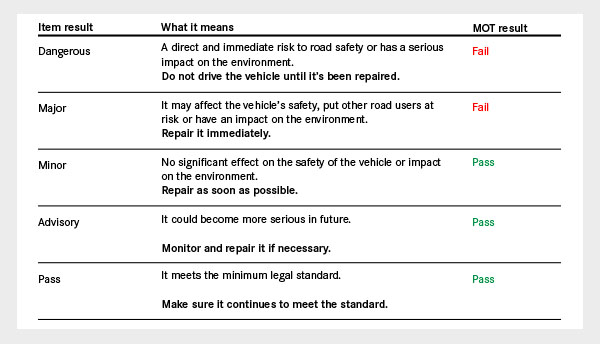We use cookies to make your experience better. To comply with the new e-Privacy directive, we need to ask for your consent to set the cookies. Learn more.


New driving laws coming into effect in 2018
New MOT legislation.
From May 20th onwards, the MOT test will be updated to include new testable items and will introduce a new categorising strategy for any faults found. In addition, some classic cars that are over 40 years old will become exempt from the test altogether. Any diesel car that has had its diesel particulate filter (DPF) altered or removed will receive an automatic fail. This will also be the case if any smoke at all is visible from the exhaust. Other items that will be tested for the first time include brake fluid, reversing and daytime running lights (where applicable) and tyre inflation levels. Defects found under the new testing procedure will be categorised as either: dangerous, major or minor. As outlined below, this depends on the type of issue and how it affects the performance of your car. Items you need to monitor will still be classed as advisories. The MOT test certificate will change to reflect this new categorising structure. Importantly, it will mean that any cars classed as having a dangerous fault will not be permitted to drive away from the test without sufficient repairs.
The MOT test certificate will change to reflect this new categorising structure. Importantly, it will mean that any cars classed as having a dangerous fault will not be permitted to drive away from the test without sufficient repairs.
Learners allowed on motorways.
 Currently the only way for a learner driver to experience motorway driving before going it alone is to take an advanced driving course such as the Pass Plus. However, from 4th June driving laws will change to encourage instructors to include some sort of motorway training in their pre-test classes. This will only be applicable to approved instructors using dual controls and will not be permitted during private lessons.
In spite of these changes, the new legislation will not see the driving test altered to include motorway driving. This is because it would be impractical in the more remote parts of the UK.
Currently the only way for a learner driver to experience motorway driving before going it alone is to take an advanced driving course such as the Pass Plus. However, from 4th June driving laws will change to encourage instructors to include some sort of motorway training in their pre-test classes. This will only be applicable to approved instructors using dual controls and will not be permitted during private lessons.
In spite of these changes, the new legislation will not see the driving test altered to include motorway driving. This is because it would be impractical in the more remote parts of the UK.
Smart motorways.
New Automatic Number Plate Recognition (ANPR) cameras will enforce stricter penalties for misusing the hard shoulder or closed lanes on smart motorways. These cameras will automatically trigger a £100 fine and a three point licence penalty for any driver using the hard shoulder when it is closed or driving in a lane marked with a red ‘X’ above it.Vehicle Excise Duty.
 The beginning of the new tax year will again see the government enforce an increase in vehicle tax based on emissions.
There are two parts to the legislation. Part one sees first year tax rates increase for all newly registered cars with CO2 emissions of 75g/km or above. Part two affects diesel cars that emit more than 0.080g/km of NOx. Those that do not meet this Real Driving Emissions 2 (RDE2) standard will be taxed in the tax band higher than their car falls in their first year.
This will affect all newly registered cars until manufacturers are able to test their vehicles and could mean an increase of up to £500 for some drivers.
Read our guide to find out more about these tax changes and how they might affect you.
The beginning of the new tax year will again see the government enforce an increase in vehicle tax based on emissions.
There are two parts to the legislation. Part one sees first year tax rates increase for all newly registered cars with CO2 emissions of 75g/km or above. Part two affects diesel cars that emit more than 0.080g/km of NOx. Those that do not meet this Real Driving Emissions 2 (RDE2) standard will be taxed in the tax band higher than their car falls in their first year.
This will affect all newly registered cars until manufacturers are able to test their vehicles and could mean an increase of up to £500 for some drivers.
Read our guide to find out more about these tax changes and how they might affect you.
